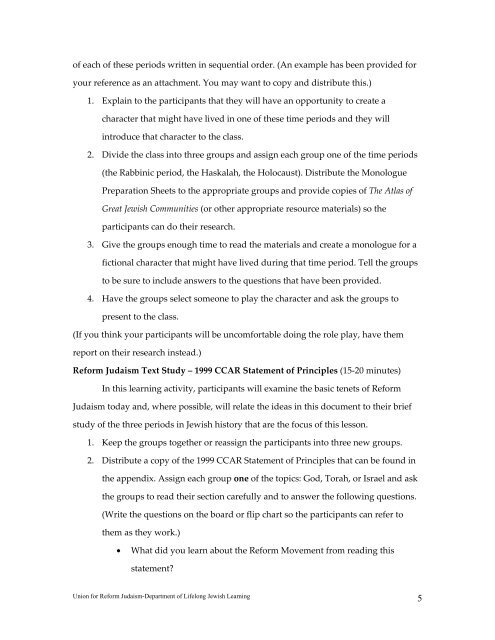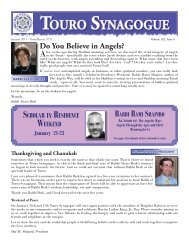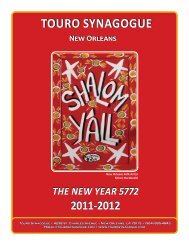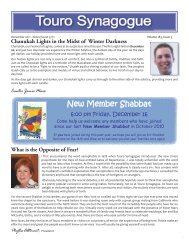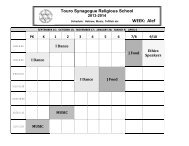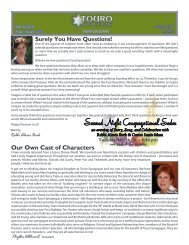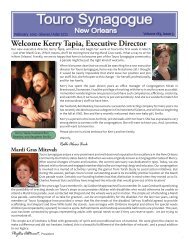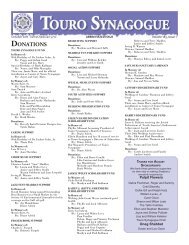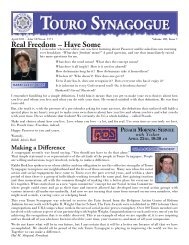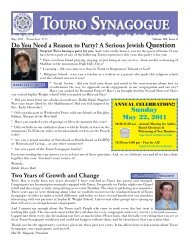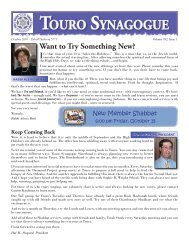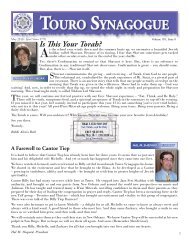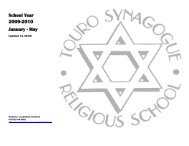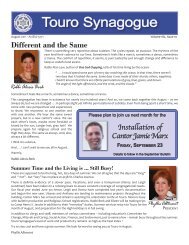Reform Judaism for Teachers module - Touro Synagogue
Reform Judaism for Teachers module - Touro Synagogue
Reform Judaism for Teachers module - Touro Synagogue
You also want an ePaper? Increase the reach of your titles
YUMPU automatically turns print PDFs into web optimized ePapers that Google loves.
of each of these periods written in sequential order. (An example has been provided <strong>for</strong><br />
your reference as an attachment. You may want to copy and distribute this.)<br />
1. Explain to the participants that they will have an opportunity to create a<br />
character that might have lived in one of these time periods and they will<br />
introduce that character to the class.<br />
2. Divide the class into three groups and assign each group one of the time periods<br />
(the Rabbinic period, the Haskalah, the Holocaust). Distribute the Monologue<br />
Preparation Sheets to the appropriate groups and provide copies of The Atlas of<br />
Great Jewish Communities (or other appropriate resource materials) so the<br />
participants can do their research.<br />
3. Give the groups enough time to read the materials and create a monologue <strong>for</strong> a<br />
fictional character that might have lived during that time period. Tell the groups<br />
to be sure to include answers to the questions that have been provided.<br />
4. Have the groups select someone to play the character and ask the groups to<br />
present to the class.<br />
(If you think your participants will be uncom<strong>for</strong>table doing the role play, have them<br />
report on their research instead.)<br />
<strong>Re<strong>for</strong>m</strong> <strong>Judaism</strong> Text Study – 1999 CCAR Statement of Principles (15‐20 minutes)<br />
In this learning activity, participants will examine the basic tenets of <strong>Re<strong>for</strong>m</strong><br />
<strong>Judaism</strong> today and, where possible, will relate the ideas in this document to their brief<br />
study of the three periods in Jewish history that are the focus of this lesson.<br />
1. Keep the groups together or reassign the participants into three new groups.<br />
2. Distribute a copy of the 1999 CCAR Statement of Principles that can be found in<br />
the appendix. Assign each group one of the topics: God, Torah, or Israel and ask<br />
the groups to read their section carefully and to answer the following questions.<br />
(Write the questions on the board or flip chart so the participants can refer to<br />
them as they work.)<br />
• What did you learn about the <strong>Re<strong>for</strong>m</strong> Movement from reading this<br />
statement?<br />
Union <strong>for</strong> <strong>Re<strong>for</strong>m</strong> <strong>Judaism</strong>-Department of Lifelong Jewish Learning<br />
5


